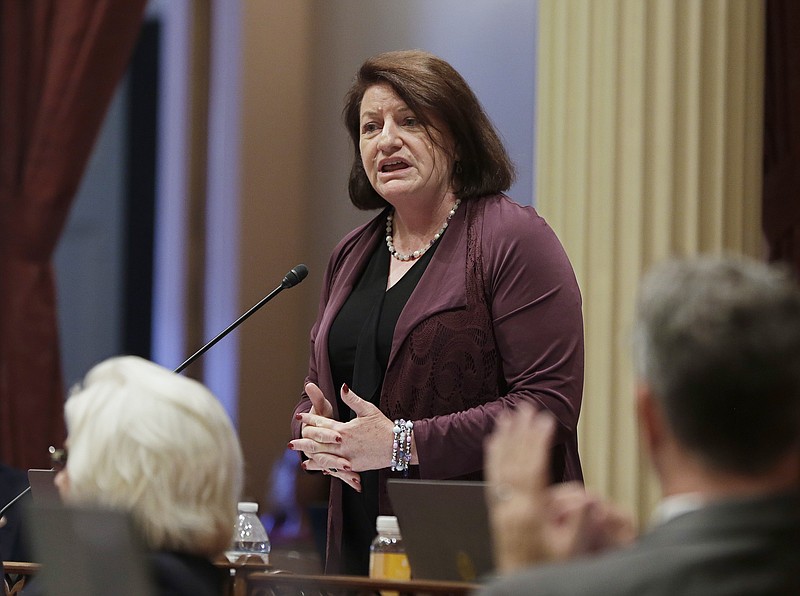In the first week of 2019, an investigation by Oregon's labor agency deemed the state Capitol to be a hostile workplace because of an unchecked pattern of sexual harassment among lawmakers.
A few days later, two Washington state lawmakers accused of sexual misconduct resigned. Then came new allegations of sexual wrongdoing in Georgia, Pennsylvania and Massachusetts, where a veteran male lawmaker was accused of groping a newly elected female colleague during a pre-session reception.
"We've heard for a long time that this is the culture in the building, and then of course we get there and it immediately surfaces," said Massachusetts state Rep. Lindsay Sabadosa, a first-time lawmaker.
Barely a month into the 2019 legislative sessions, it already is clear that the #MeToo movement was not a one-year phenomenon in many state capitols. New claims of sexual misconduct are continuing to be made public concerning actions ranging from a few weeks ago to many years ago.
The latest came Friday, when Montana legislative leaders revealed that a previously unpublicized allegation of sexual harassment helped drive their current push to update policies on harassment, discrimination and retaliation.
Although half of all state legislative chambers updated their sexual harassment policies last year, an Associated Press review found that many are still looking to make changes this year.
Some states are taking their first steps since the October 2017 media reports alleging sexual misconduct against movie mogul Harvey Weinstein sparked a national movement of people coming forward with accounts of sexual assault or harassment. In other states, lawmakers and women's advocates are looking to take the second or third steps in what they say is a long trek toward changing attitudes and behaviors.
Sabadosa is sponsoring legislation that would create an independent commission to investigate complaints of workplace harassment by Massachusetts lawmakers. She said a House rule change adopted last year didn't go far enough when it created a new staff position for an equal employment opportunity officer to investigate complaints.
"It feels important for the first-year class to come in and say, 'We are done, this is enough, that culture needs to end and we're going to be the people to make sure that it happens,'" she said.
Across the country, at least 90 state lawmakers have resigned or been removed from office, faced discipline or other repercussions, or been publicly accused of sexual misconduct since the beginning of 2017, according to an ongoing tally by the Associated Press. Sexual misconduct allegations also have toppled high-ranking executive branch officials, including Missouri Gov. Eric Greitens, New York Attorney General Eric Schneiderman and Louisiana Secretary of State Tom Schedler.
More than a half-dozen members of the U.S. Congress accused of sexual misconduct also resigned. A new federal law that took effect in January extended sexual harassment protections to congressional interns, gave victims access to confidential advisers and made lawmakers personally liable for financial settlements stemming from harassment or retaliation.
An AP review last August found about half of the 99 state legislative chambers had updated their own sexual harassment policies since the #MeToo movement began (Nebraska has just a single legislative chamber). The most common response was to boost their own training about sexual harassment, typically by making it mandatory or providing it more frequently. Only a few legislatures passed measures that apply to private-sector workers.
Indiana legislators passed a law last year requiring them to take at least one hour of sexual harassment training annually and creating a committee to develop new sexual harassment policies.
In January, the House and Senate followed through by adopting policies expressly forbidding unwanted sexual advances and retaliation against those who make complaints. The policies also ban any sexual contact between lawmakers and interns.
The new Indiana policies come after a year in which the state attorney general and House speaker both were named in sexual misconduct allegations, which they denied.
"We want to make sure people understand we realize the importance of these issues," said Republican Sen. Liz Brown, an attorney who helped draft the new rules.
Brown, who is chairwoman of the Senate's ethics committee, said the rules were "thoroughly vetted and very thoroughly researched," protect confidentiality and provide flexibility for legislative investigators to get outside help if needed.
But Jennifer Drobac, an Indiana University law professor who has written a textbook on sexual harassment law, described the new policies as disappointing. She said they use outdated definitions of sexual harassment, require a higher standard of proof than most civil cases and fail to require an outside investigation of complaints.
"What they have adopted is a late-20th century, lukewarm approach to the problem," Drobac said. "It's not committed, it's not rigorous, it's not up to date, and it does not instill confidence in my mind."
Other states also have received both praise and criticism for their responses to sexual harassment.

